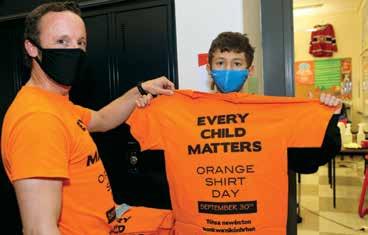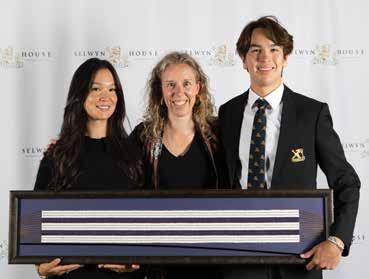
3 minute read
Indigenization process underway at SHS
Selwyn House School is resolving to become more indigenized. “The administration team and I are unanimously committed to this significant initiative,” says Headmaster Mike Downey. “Through this multi-year process, our vision is to incorporate Indigenous ways of knowing, being, doing, and relating into the educational, organizational, cultural and social structures of the school. It is essential that this is done in a sustainable, personalized, and meaningful way.
“We have recently taken some introductory steps in our longterm commitment to indigenizing our school. In 2019, we formed an Indigenous Student Committee (ISC) with the aim of better supporting our Indigenous students at SHS. In 2020, we also began working with Wahiakatste (Wahi) Diome-Deer, an educational consultant, who has joined our team to help us develop our indigenization plan. For many months, she has been collaborating with our Director of Experiential Education, Courtney Prieur, and our Coordinator of Outdoor Education, Cory Deegan, and with me to develop concrete objectives for meaningful change.”
Advertisement
To ensure that the Indigenous portion of the student body has a presence in the school, the ISC is proposing a series of goals, including more education around Indigenous issues, including professional development for staff, plus more activities like the recently successful Orange Shirt Day.
Mr. Deegan says they are also proposing the drafting of a selfwritten land acknowledgement, “a statement that pays tribute to the land we live on, its history and importance to our gathering.”
In addition to being a traditional Indigenous woman from the community of Khanawake, and the sister of four Selwyn House Old Boys, Ms. Diome-Deer brings a wealth of education and experience to her leadership role.
She completed her Master’s Degree in educational leadership at McGill, works as an independent consultant in education, and is a columnist for the Globe and Mail. She holds a Master’s degree in psychology and brain sciences from Dartmouth College and has recently completed graduate work in psychology at Harvard.
Ms. Diome-Deer explained to the Selwyn House group that indigenization is an “institutional initiative to support societal reconciliation.” It calls for policies and practices that increase inclusion, break down barriers and realign school outcomes without harm to previously established goals. It proposes working Indigenous ideas, concepts and practices into school curricula, fostering a greater understanding of Canada’s colonial history, and engaging in critical reflections about how to build safe and ethical spaces for Indigenous knowledge, worldviews and practices.
Change does not take place overnight, Ms. Diome-Deer points out. Indigenization is a long-term, multi-level process. Through its Truth and Reconciliation Council, the Canadian government has called for similar changes in schools of all levels, public or private, in order to introduce “a fuller sense of history” in schools.
“Our team is now well into the assessment phase,” says Ms. Prieur. “One of the most important elements of this process has been including all stakeholders through group discussions. Hearing from our community has been the most profound element of this process so far.”
One such example is the comment from Old Boy Arnold Lazare ’79, the first Indigenous student at Selwyn House. “I am pleased that it’s happening,” he said. “I will advocate for SHS. SHS was bilingual before it was popular. It’s the tip of the spear. For me, SHS has always been a leader.”
If you would like to participate in the survey, contact Courtney Prieur at Selwyn House. (prieurc@selwyn)
Outdoor Education Coordinator Cory Deegan with Ben Cohen (Grade 7) on Orange Shirt Day last September Wahi Diome-Deer, left, and Thiréhtha Diome-Deer, right, present a Two-Row Wampum to Selwyn House, represented by Courtney Prieur, Director of Experiential Education.











